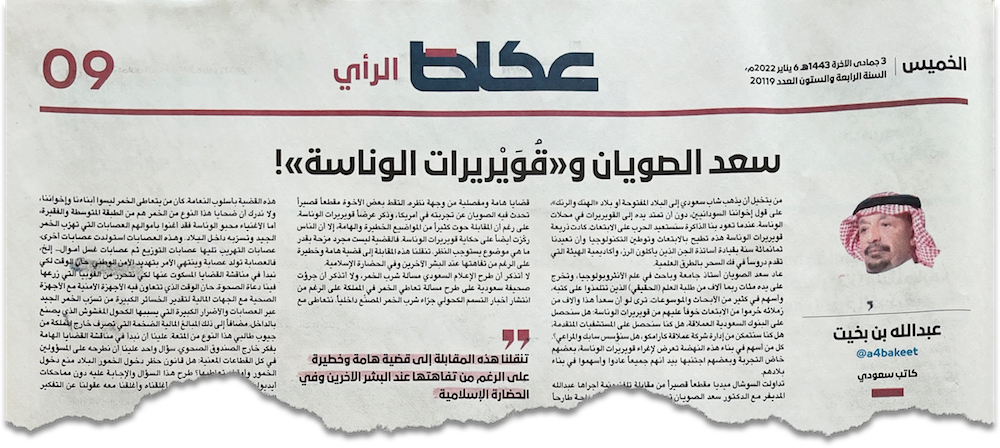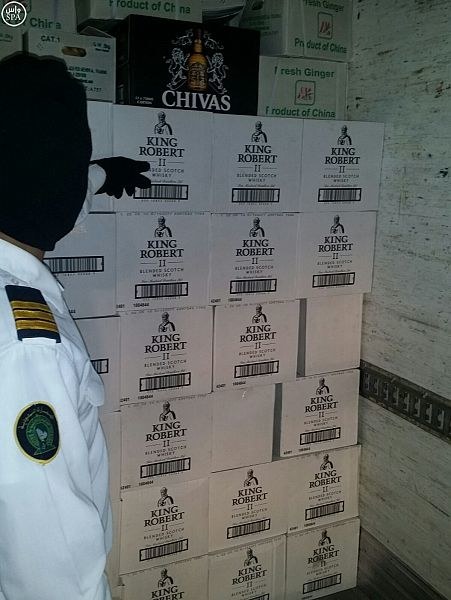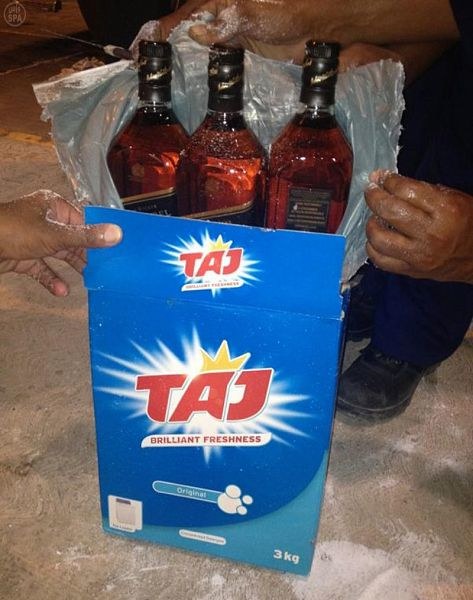RIYADH: On Jan. 6, a Saudi columnist for the Jeddah-based newspaper Okaz turned his attention to one of the Kingdom's most pressing issues, but one that is rarely talked about — alcohol.
It was a bold article, given that the topic is rarely discussed on public platforms.
But at its heart was a stark message with wide-ranging social, religious and public health implications: There are major problems with the way alcohol has been dealt with that must be discussed.
“I do not remember that the Saudi media raised the issue of drinking alcohol, and I do not remember that a Saudi newspaper dared to raise the issue of alcohol abuse in the Kingdom despite the spread of alcohol poisoning as a result of drinking locally manufactured alcohol,” Abdullah bin Bakheet wrote.
“We deal with this issue in an ostrich manner.”

The Okaz column exploring the issue earlier this year. (AN Photo)
He continued: “It is as if those who drink alcohol are not our sons and brothers, and we do not realize that the victims of this type of alcohol are from the middle and poor classes, while the rich people who love (alcohol) have enriched with their money the gangs that smuggle good wine and sell it inside the country.”
Although it is rarely spoken about or covered in local media, it is no secret that there is a burgeoning underground alcohol scene in Saudi Arabia, complete with all the health and social issues that it brings.
Saudi Arabia has a youthful population. A recent review of research on the subject of substance abuse in the Kingdom noted that, of the 7 to 8 percent of all Saudis who reported using substances including alcohol, amphetamines and heroin, 70 percent were aged between 12 and 22.
The authors of the paper, “Substance use disorders in Saudi Arabia: a scoping review,” published in the journal “Substance Abuse Treatment, Prevention, and Policy” in June 2020, warned that Saudi Arabia’s “demographic distribution is heavily tilted toward youth (around 15% of the total population is between 15 and 24 years old) and youth are most affected by substance use.”
The authors, from the College of Medicine at Sulaiman Al-Rajhi University in Bukairyah, Al-Qassim, concluded that “a comprehensive review on SUD (Substance use disorders) research in Saudi Arabia is timely and can be the starting point for understanding this problem for both the policymakers and local researchers.”
In Saudi Arabia today, it is an open secret that young people — nationals and expats alike — regularly attend alcohol-fueled underground parties throughout the Kingdom. These range from groups of friends meeting and drinking in compounds, to private raves organized in secret locations disclosed to trusted invited guests by message only on the day itself.
Faced with upholding the prohibition on alcohol even as it opens up to the wider world, Saudi Arabia is in danger of becoming a victim of the law of unintended consequences, with parallels to be drawn with America’s flirtation with an alcohol ban in the early 20th century.

An illegal alcohol shipment seized by Saudi Customs. (SPA)
Prohibition, and the 18th amendment to the U.S. Constitution that framed it, was the product of sustained pressure from temperance campaigners and religious revivalists. It was, said President Herbert Hoover at the time, a “great social and economic experiment, noble in motive and far-reaching in purpose.”
But it was an experiment that failed.
Prohibition began in 1920 but was ended after 13 disastrous years. Noble it may have been, but its first effect was to bankrupt thousands of businesses and destroy the jobs of the countless people they employed.
The second consequence was the overnight creation of a new black market and hugely profitable revenue stream for organized crime. Corruption among police officers and agents of the Bureau of Prohibition was rife.
Illegal stills, speakeasies and bootleggers sprang up everywhere, and with deadly effect: During prohibition an average of a thousand people died every year from alcohol poisoning.
But the biggest shock of all was felt by the government itself, which suddenly lost a hugely significant source of taxes — in the case of New York, almost 75 percent of all revenue — causing an estimated tax shortfall for the federal government of over $11 billion.
The trigger for the column in Okaz was reaction on social media to a television interview with Dr. Saad Al-Soyan, a veteran Saudi sociologist and anthropologist who studied in America and Germany before returning to the Kingdom in 2003 to work as a professor at King Saud University.
During the interview, which touched on many serious issues, Al-Soyan happened to mention in passing the “little bottles” of alcohol found in U.S. supermarkets that, as Bakheet noted in his column, many of his contemporaries and subsequent generations of young Saudis had encountered while studying abroad.
Critics, wrote Bakheet, had extracted that short clip from the lengthy interview and circulated it disapprovingly on social media.
Bakheet, a novelist whose 2010 work “Al-Atayef Street” was long-listed for the International Prize for Arabic Fiction, said the reality was that Al-Soyan and many others who, like him, had studied abroad, had returned to their homeland to teach tens of thousands of Saudis.In so doing they had fulfilled the aim of the King Abdullah Scholarship Program to create a knowledge-based society equipped to compete economically and academically on the world stage.
Bakheet, who has 39,000 followers on Twitter, rebuked the religious conservatives who had so bitterly opposed the scholarship program, which after its introduction in 2005 saw the number of Saudi students studying abroad increase dramatically.
The “war on scholarships,” waged on the basis that while in Europe or the U.S. young Saudis would be tempted to try alcohol, had come close to defeating the scheme and almost “took us back 800 years,” he wrote.
If Professor Al-Soyan and all the other Saudis who had ever studied abroad had been denied the opportunity for fear of exposing them to the vice of alcohol, asked Bakheet, “would we have the giant Saudi banks, would we have the advanced hospitals, would we be able to run a giant company like Aramco, would we have established SABIC (Saudi Basic Industries Corp.) and Almarai?”
Yes, he acknowledged: “Everyone who participated in building this renaissance was tempted by the temptations of “Queirerat Al-Wanasah.” Some of them went through the experience and some of them avoided it.
“But they all returned and contributed to building their country.”
Another consequence of the taboo on even talking about alcohol is the impact on research into the scale and nature of abuse in the Kingdom, compromising the ability of the authorities to deal with it and the healthcare problems it is causing — problems that devastate families and cost the state a small fortune in medical and rehabilitative services.
The researchers at Sulaiman Al-Rajhi University, writing in the journal Substance Abuse Treatment, Prevention, and Policy in June 2020, carried out a review of all published literature on the subject of substance use disorders in Saudi Arabia, including alcoholism, and found there was a woeful lack of knowledge on the subject.
Of the 23 papers on the subject they were able to find in the literature, all were “outdated, weak in methodology, and poor in quality.” All had drawn their samples from hospitals in the western, central and eastern regions, only two included women, and the most recent had been published in 2013. The problem of substance abuse had most certainly worsened in the decade or more since the most recent research had been carried out.
Today, “the absolute number of people who have a substance use problem is likely high in Saudi Arabia because its demographic distribution is heavily tilted toward youth and youth are most affected by substance use.”
Given “the changing nature of Saudi society, which has traditionally been deeply religiously conservative, sustained by the Islamic principles of balance, restraint, and modesty,” more research into the problems of alcohol and drug abuse is urgently needed.
Of course, there are those who reject these findings and argue that alcohol has always been consumed in secret in the Kingdom.
“This has nothing to do with the age of the drinker. There are a lot of those who consume whiskey and wine in their 60s and 70s and have been doing so for decades,” a Saudi citizen told Arab News on the condition of anonymity.
He added: “Those who drink can buy from the black market, at a ridiculously hiked price. Those who can’t afford known brands end up buying locally made home brew, which can be poisonous and have all sorts of health hazards.”
There is another factor to be considered in the alcohol discussion.
Opening up to tourists and expats is a key component of the Vision 2030 blueprint for diversifying Saudi Arabia’s economy away from reliance on fossil fuels. To make its way successfully in a post-oil world, while preserving its unique cultural identity, the Kingdom is aligning itself more closely with global social norms as it increasingly opens its doors to the outside world.
Creating exciting new megaprojects, such as NEOM and Diriyah Gate, and staging globally appealing sporting and cultural events, the Kingdom is spotlighting its cultural and historical appeal as a unique destination and will see millions of visitors, Muslim and non-Muslim alike, pouring in.
But is the availability of alcohol a must to attract the 100 million visits it wants to achieve by 2030?
Well, not according to a recent Arab News interview with Saudi Minister of Tourism Ahmed Al-Khateeb. When asked whether alcohol would be permitted in the Kingdom given its popularity among tourists, he pointed to extensive research showing that “40 to 50 percent of travelers would travel to destinations that do not offer alcohol.”
“We have a lot to offer other than alcohol. There is a lot to improve, be it in hospitality, culture, food and luxury, and therefore we will be competing on other things that tourists are traveling for,” he said.
“I believe you know our destinations at mainly the Red Sea will be positioned among the best destinations globally by 2030 and people will definitely experience them, even if we don’t offer alcohol.”
At the very least, as Bakheet concluded in his Okaz article, the thorny issue of alcohol can no longer be pushed under the carpet; it must become part of the conversation as Saudi Arabia embraces the brave new world.
Right now, he wrote, the alcohol business in Saudi Arabia was in the hands of gangs — smuggling gangs, distribution gangs, and money-laundering gangs, comprising a subculture whose combined impact is to threaten national security.
“It is time for us to start discussing the ignored issues in order to free ourselves from the phobia that the ‘awakening’ advocates planted in us,” he wrote.
“The time has come when the security services, health services, and financial authorities cooperate to estimate the great losses from smuggling and the great damage caused by adulterated alcohol that is made locally. In addition, huge sums of money are spent abroad from the pockets of those seeking this kind of fun.
“We need to start discussing the important issues with outside-the-‘awakening’-box thinking.”
That thinking should begin, Bakheet said, with all officials in relevant sectors asking themselves a challenging question: “Does the law banning the entry of alcohol into the country actually prevent the entry of alcohol and stop its consumption?
“Asking this question and answering it without ideological quibbles will open a door for us that has been closed for a long time, and free our minds that have been closed to scientific, practical and economic thinking.”
* Jonathan Gornall of Arab News Research & Studies Unit contributed to this report.



























